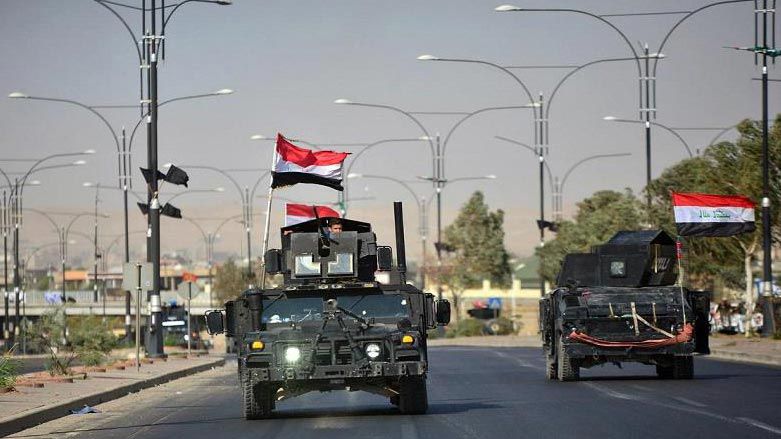Six years after Iraq’s takeover of Kirkuk, Kurdish officials reflect on the devastating impact of the October 16th betrayal.
On October 16, 2017, a significant portion of Kurdish-controlled territory, estimated at over 51% of the Kurdistan Region, fell back under Iraqi control, particularly to the Popular Mobilization Forces (PMF). This event, referred to as the “October 16th betrayal,” had far-reaching consequences for the Kurdish people and the region.
The gravity of this betrayal was highlighted by Kurdistan Democratic Party (KDP) President Massoud Barzani during his historic speech at Erbil Stadium on the last day of the Kurdistan parliamentary election campaign. In a poignant moment, Barzani declared, “Salute to Kirkuk, which has been sold twice.” This statement not only underscores the deep pain felt by Kurdish leaders over the loss of Kirkuk but also implies that this was not the first time the city had been betrayed, adding layers of historical context to the October 16th events.
Motives and immediate consequences
The primary motive behind reoccupying these areas was Arabization, especially evident in Kirkuk province where more than 25,000 Arab settler families have returned in recent years. The absence of Peshmerga and Kurdistan Region security forces led to a sharp increase in security incidents, with 4,887 recorded since the betrayal.
The aftermath saw widespread violations against Kurdish citizens:
– 3,000 homes looted in Kirkuk
– 120 administrative positions taken from Kurds and given to Arabs and Turkmen
– 200 civilian homes burned to intimidate residents
– Offices of five media outlets burned
– 50 Kurdish party buildings occupied
– Over 53,000 families displaced from Kirkuk alone
The military campaign resulted in 28 Peshmerga martyrs, 283 civilians killed, and 453 wounded by PMF and Iraqi forces.
Political fallout
The sentiment of betrayal echoed at the highest levels of Kurdish leadership. KDP President Masoud Barzani’s remark about Kirkuk being “sold twice” resonated deeply with many Kurds, encapsulating the sense of repeated historical injustices faced by the region.
The betrayal caused significant political upheaval within the Kurdish leadership. Kosrat Rasul Ali, former PUK Deputy Secretary, disavowed the actions of Jalal Talabani’s sons, accusing them of handing over 51% of Kurdistan’s territory. He stated, “Misguided and deviant individuals within the PUK have shamefully entered the black pages of history.”
Ali criticized the international community’s response, saying, “Instead of listening to the Kurdish people, they faced a conspiracy.” He blamed internal “black hands” for abandoning key positions, leading to the loss of Kurdish gains.
Najmaddin Karim, the exiled governor of Kirkuk and former PUK member, called October 16 “a betrayal that placed the people of Kirkuk under the control of occupiers.” He predicted that the people of Kirkuk would never trust the perpetrators again.
Mala Bakhtiar, another PUK official, called for a shift from a culture of accusation to one of evaluation and criticism, urging against repeating such catastrophes.
Arez Abdullah, then a PUK Leadership Council member, emphasized the magnitude of the loss, equating it to “half of Kurdistan’s territory” and comparing it to historical oppressions against the Kurdish people.
Consequences in Kirkuk
The betrayal led to significant changes in Kirkuk’s administration:
– Appointment of Rakan al-Jabouri, an Arab, as acting governor
– Removal of eight Kurdish directors and 51 department heads
– Loss of 126 government positions for Kurds, including 27 high-level positions
Security deteriorated, with ISIS militants attacking Iraqi forces 413 times, killing 42 soldiers. Most former Peshmerga positions are now occupied by Iraqi forces.
Agricultural lands of Kurdish farmers in disputed areas face threats of Arabization, an issue that remains unresolved and recurs annually.
Recent developments
As of October 2024, the situation remains tense. Hassan Majid, a Kurdistan Democratic Party official, reported that all three district administrator positions in Kirkuk would be given to Arabs, undermining coexistence and balance.
Hama Reger, commander of the Kirkuk Peshmerga Command, accused the PUK of facilitating the PMF’s entry into Kirkuk without resistance. He alleged that the PUK had wider ambitions, including allowing the PMF to occupy Erbil.
Reger also highlighted ongoing demographic changes, stating, “The PUK knows that the Popular Mobilization Forces go to Kurdish homes in the villages, expel them from their own land and property that belongs to their fathers and grandfathers, now they are relocating the people and occupying their properties, settling Arabs from the south and central Iraq in their places and Arabizing Kirkuk.”
Eyewitness accounts
Major Muhammad Mala Jihad, a Peshmerga eyewitness, recounted their two-year defense of Kirkuk against ISIS, expressing shock at the PUK’s actions: “Without our knowledge, the PUK began selling Kirkuk, without regard for the blood of martyrs and the parents and children of martyrs.”
Muhammad Mala Ismail, a farmer in Topzawa, spoke of the generational impact: “We are raising our generations with the knowledge that a black day came upon the Kurdish nation, which is the great betrayal of October 16.”
From southern Kirkuk to Sargeran district, Kurdish farmers’ lands remain under threat of Arabization, while efforts to erase Kurdish presence within the city continue.
This betrayal marks a significant setback for Kurdish autonomy and control over disputed territories, particularly Kirkuk. It has led to demographic changes, security challenges, and a reshuffling of political power that continues to impact the region years later. The event has created deep divisions within Kurdish political circles, particularly regarding the role of the PUK in facilitating Iraqi and PMF control. The ongoing threats to Kurdish lands and identity in the affected areas suggest that the consequences of this betrayal will be felt for years to come.
The Kurdish Globe

